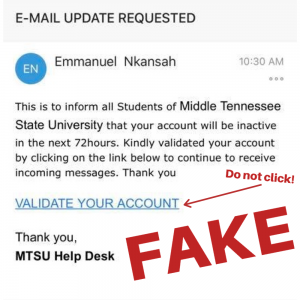Featured Photo by Markus Spiske on Unsplash
HOT TAKE ALERT: Two-factor authentication is a great addition to our university accounts, and you should use it elsewhere, too.

Now that I have your attention, let’s talk about safety. Cyber safety.
Cyber safety is incredibly important in an age where hacking and data breaches dominate headlines and cause massive headaches for individuals and organizations alike.
And while you may think, “Who would try to gain access to my school account?” it is actually a major problem for schools around the globe.
“Cyber safety is more important today than ever. Unfortunately, universities are frequent targets for spammers and other malicious actors who try to take advantage of faculty, staff, and students,” says Chad Mullis, MTSU’s Assistant Vice President for Technical Services.
“Phishing attacks, malware, and social engineering also constantly target the University population with the intent of stealing users’ credentials to gain unauthorized access to MTSU systems.”
Simply put, cyber safety is super important. So what can you do to beef up your security? Lucky for you, we have some great tips from the fine folks of the Information Technology Division!
Use multi-factor authentication

Photo by Glenn Carstens-Peters on Unsplash
I know that you’re still probably mad at me for talking about two-factor authentication, but it’s actually very useful and important. Without it, hackers can get into your account and steal your information if they simply have your password. That’s a scary thought.
While it can be a little bit tedious to approve your login via a separate device each time you sign-in to your account off-campus, it is seriously worth it. While you may not care if someone logs in and takes your quizzes for you, there is a lot of important information that is left vulnerable if you aren’t securing your account.
When it comes down to it, taking a few seconds to verify your identity causes much less of a headache than having to deal with your identity being stolen.
Practice good password hygiene
This tip, for the most part, is one you’ve been hearing since you were little. Be careful with your Webkinz/Poptropica/Club Penguin passwords (Anyone? Just me?), or else you might lose your account. However, we’ve also got some scorching hot new tips for you!
Obviously, never share your password with anyone. This isn’t Netflix or Spotify. Although in reality, you shouldn’t be sharing those passwords either. It isn’t safe.
You should also never use the same password for different accounts. If someone manages to gain access to your account using your password, their next goal will be to try that password on other accounts under your name. That’s how a situation quickly goes from bad to worse, so consider using a password manager and stop reusing the same password!
Finally, and this is one you may not expect, use passphrases instead of passwords. You may think a random jumbled mess of characters is a more secure password than actual words, it doesn’t help you at all if you can’t remember it. Just remember, the longer your password is, the more secure it will be.

This is an example of a scam email that you may find in your e-mail inbox. Do not click any links or respond to these emails, as they may be able to steal your information!
Be careful with unsolicited emails
While earning $600 a week to work an unspecified job at an unspecified company is very much tempting, this is a prime example of a spam email, sent with the intention of eventually getting money out of you. It isn’t a real job offer.
If you receive any type of email asking you for something, no matter how legitimate it looks, and you don’t know why you received it – it’s probably a scam email. Don’t click any links that you aren’t sure of and report all suspicious emails to abuse@mtsu.edu.


COMMENTS ARE OFF THIS POST